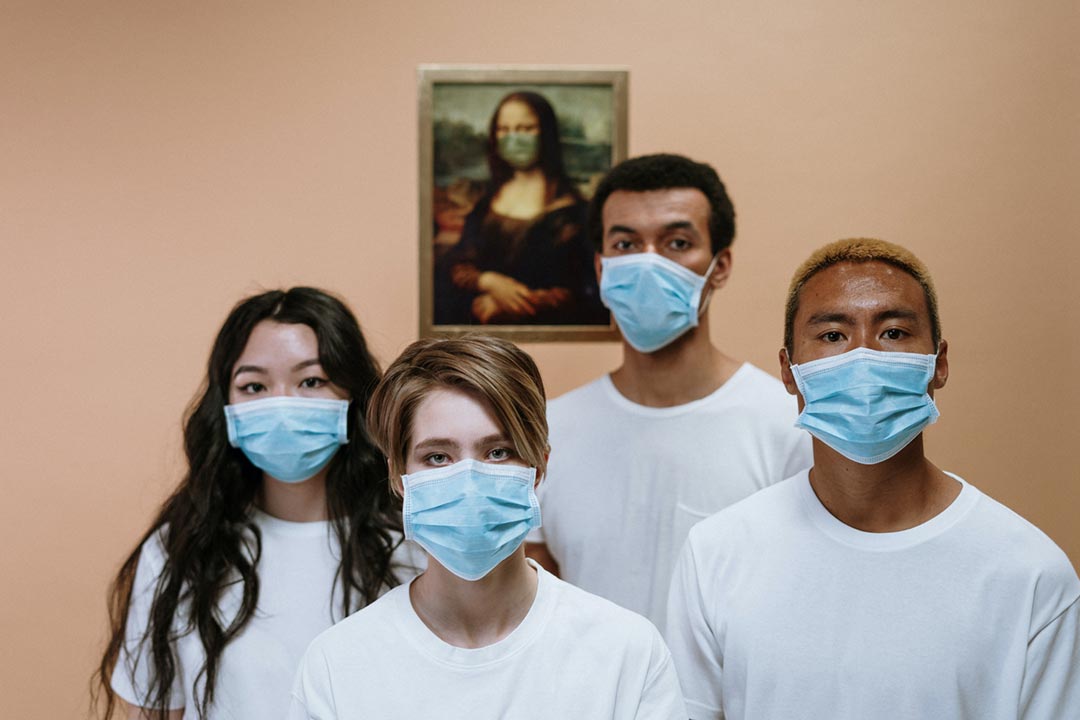Why do so many people hate wearing masks?
Some refused to believe they protected against COVID-19, others protested in violent anti-mask demonstrations. Why have face masks caused such extreme reactions?
- 4 October 2023
- 6 min read
- by Gavi Staff

The first time someone muttered angrily at me for wearing a face mask was on the underground in London in 2021. While pandemic restrictions were mostly over by then, being squashed together in a packed carriage seemed to me, as an asthmatic, to be a sensible precaution.
It then happened again at a crowded concert hall and then again on a plane. And this wasn't just happening to me. In August 2021 in Texas, an angry parent ripped a mask off a teacher. Meanwhile, hundreds of people were gathering in places as varied as Belfast and Vancouver in "freedom" rallies, protesting against lockdowns and being forced to wear masks.
"People don’t like wearing masks because they make it hard to communicate with each other. Masking makes it much harder to read emotions or facial cues; we have trouble hearing what people are saying; it makes communication almost impossible for those who rely on lip-reading."
– Darryl Stellmach, Medical anthropologist, University of Tasmania, Australia,
As we enter into winter in the northern hemisphere, there are still 100,000 global cases of COVID-19 a day still (likely a massive underestimate as many countries are not counting anymore), and the virus is continuing to evolve, creating new variants such as Eris and Pirola.
This has led to speculation over whether we might return to mask mandates in certain settings such as in health clinics or hospitals, although lockdowns seem unlikely. If so, it would be interesting to see what the response would be from those who have been so ferociously opposed to masks.
"Freedom" fighters?
The pushback against masks has often dovetailed with anti-vaccine sentiments.
The resistance to lockdowns is somewhat understandable as they do curtail our freedoms in significant ways and for many of us, especially those who rely on informal employment, the quarantines in 2020 and 2021 had major financial repercussions. Vaccine hesitancy is more nuanced, though it can sometimes be explained by a lack of vaccine confidence rather than a total anti-vaccine stance.
By contrast, wearing a mask might seem less of an 'impingement on our civil liberties' (as some have argued), but it remains important to understand why people are so opposed to a public health measure that the UK Royal Society's report shows "unequivocally" cut the spread of COVID-19.
Medical anthropologist Darryl Stellmach, at the University of Tasmania, Australia, says there are several reasons why people may be anti-mask, but being anti-science or highly politicised is not the most significant, he says.
"People don't like wearing masks because they make it hard to communicate with each other. Masking makes it much harder to read emotions or facial cues; we have trouble hearing what people are saying; it makes communication almost impossible for those who rely on lip-reading."
He adds: "Ironically, hospitals – one of the places where masking is most likely to be mandated – are also places where non-verbal cues play a pivotal role in communication. We know that 'bedside manner' is essential to patient care – yet it's very hard to deliver bad news in a compassionate way while wearing a mask.
"It's hard to give instructions on how to take medication, or interpret a patient or family's wishes if everyone is masked. These are already delicate interpersonal relations – they need a lot of skill and nuance to manage – yet masking makes them much harder."
Acknowledging this complexity is important, Stellmach says. "It's the kind of paradox found throughout epidemic response – every measure we take to combat illness has a downside or unintended consequences. The only solution to the paradox is to recognise that it exists, and to take account of it when making policy decisions."
Have you read?
There are also more negative reasons why people don't want to wear masks. Misinformation spread through "a small but militant anti-mask movement that works through tendentious, bad-faith argument or plain falsehoods" is one reason.
Another, says Stellmach, is the erosion of public trust in health organisations and the government, which can sometimes be fuelled by overly simplified messaging that fails to acknowledge the risks inherent in any medical treatment.
Confusing messaging or ever-changing advice, even though this can be the reality in a constantly evolving crisis, doesn't help. In 2021 researchers Steven Taylor, at the Department of Psychiatry, University of British Columbia, and Gordon Asmundson at the Department of Psychology, University of Regina, Saskatchewan, Canada published a study on anti-mask attitudes.
Their paper, published in PLoS ONE, noted that there was inconsistent messaging about face masks at the start of the pandemic, with the World Health Organization advising that healthy people only needed to wear face masks if they were caring for someone suspected to have COVID-19.
Psychological pushback
Taylor and Asmundson collated data on the reasons that people cite for not wearing masks, such as not believing that masks are effective or the belief that they are an impingement on their freedoms.
The latter, they say, feeds into a phenomenon called "psychological reactance", which is a pushback against "rules, regulations, or attempts at persuasion that are perceived as threatening one's sense of control, autonomy, or freedom of choice". In other words, being forced to wear a mask makes people feel like they are not in control of their own lives.
Stellmach adds: "There may be a perception that a return to masking will be a first step on a slippery slope to more significant restrictions on personal freedoms."
Getting the tone of messaging right is important in swaying people who are anti-mask, such as using messages that might say "Please do your part in managing the pandemic by wearing a mask. The choice is yours," or "You have a right to wear a mask to stay safe. Don’t let anyone take away your right."
What is concerning, say Taylor and Asmundson, is that the resistance to wearing masks is often connected with other rebellions such as the refusal to get vaccinated. Pinpointing groups where psychological reactance is likely to happen is not an exact science, although they say it is connected with political conservatism, which favours limited government interference.
Flawed messaging
Flawed newspaper articles, such as a New York Times op-ed incorrectly suggesting The Mask Mandates Did Nothing, can mean a backsliding of progress made in convincing people that masks do indeed work. Stellmach says that the Times piece, which ended up going viral, wildly "misinterpreted" the Cochrane review it refers to.
The review, published in January 2023, concluded that, with the data they had to go on, they were "uncertain whether wearing masks or N95/P2 respirators helps to slow the spread" of SARS-CoV-2 or flu-like respiratory viruses, but clearly states that "the high risk of bias in the trials, variation in outcome measurement, and relatively low adherence with the interventions during the studies hampers drawing firm conclusions".
It's important to remember though, says Stellmach, that the Cochrane finding "has been overinterpreted, including by the study's own lead author. When the lead author has the wrong end of the stick, it's hard to blame the public for misinterpreting the results."
For Taylor and Asmundson, getting the tone of messaging right is important in swaying people who are anti-mask, such as using messages that might say "Please do your part in managing the pandemic by wearing a mask. The choice is yours," or "You have a right to wear a mask to stay safe. Don't let anyone take away your right."
If countries do decide to impose mask mandates or guidance in the coming months, speaking to the people who are reluctant to wear them will be critical. Even when COVID-19 is less of a public threat, another respiratory health outbreak is likely only just around the corner.









